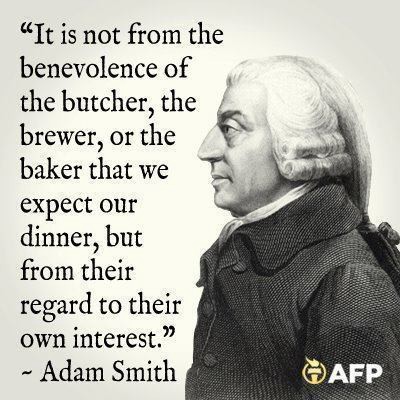The Independent Wholesaler Advantage | The Luxury Of Self-Expression Through Our Work

I recently discussed some of the foundational principles which I believe lead to mutually beneficial relationships – overlapping ideal systems (ethos) bound with a mutual quality of loyalty. The lofty result of an evolved capacity for ideals enabling cooperation and connection beyond the “tic-for-tat” survival interaction. These prerequisites create an added value to the relationship manifested in the virtue one another observes. It creates a trustworthy, comfortable environment where efficiency and ideas flourish. While this may suffice among immediate, close relationships, the nature of our complex economic system begs the question of how this applies as a whole – how is it possible for millions of interactions among individuals, companies, and organizations, who share little to no loyalty or trust, able to gain value. When examined, an irony presents itself in the way that we all benefit from something unexpected- people acting purely in their own self- interest.
All of the value in our lives – the enrichment relationships give us and the material possessions that bring us utility and comfort, are derived from a somewhat predictable means of interaction. We looked at the conditions necessary for this on a “micro” level but when the aperture is widened, when markets and the economy as a whole are considered, a new foundation presents itself as the force driving our pursuit of value. Large populations and consequently large markets are composed of a broad range of individuals whose ideal systems and beliefs may not overlap. Mutually beneficial interactions seemingly become impossible on this scale and as a whole, may seem to be an environment where chaos reigns and virtue is nonexistent. While all of these participants are under no obligation to act on one another’s best interest, you can bet they are acting in their own. And this is where we find the unexpected virtue of self-interest.

Scottish philosopher and proto-economist Adam Smith was among the first to recognize this in his Wealth of Nations. His work covers many of the principles which modern economic theory is based and a full examination is beyond the scope of the article. The important lesson he conveyed is that extra value, for society as a whole, is derived from market participants acting purely in “rational self-interest”. Implicitly acknowledged by those engaged in an economic transaction, self-interest forms a common reference point where one party understands that the other is seeking to maximize their own benefit.
This commonality serves as the predictable measure when engaging in economic interactions; a necessity prerequisite for the “invisible hand” (Smith’s term for market forces based on the collective behavior of individual participants). The aggregate of this “rational behavior” results in efficient markets, lower prices, more productivity, (hopefully) higher profit, basically every benefit which applies to society as a whole: A tradesman selling his labor to provide for his family; the business seeking profit enabling payment to employees and investment in expansion; the financier brokering capital; the state, local, and federal governments seeking tax revenue to provide services for its citizens. Our economy is a gestalt composed of millions of individuals seeking to maximize their best interest resulting in the greater value we all derive.
Ideals “sit away” from us as common reference points for the development of a common ethos. Individuals engaged in the relationship benefit directly from this arrangement in that the relationship offers some aspect of bolstering their own self-interest; if the relationship was sour and no benefit was gleaned by the respective parties, then virtue and the consequent value would not exist. Our capitalist economic system, a natural extension of our Enlightenment Era doctrine of law emphasizing individual freedom, provides the necessary framework for individuals to engage in a somewhat rational and predictable means of interaction; similar to the notion of overlapping ideal systems among individuals on a more interpersonal level. We, as consumers and producers, are afforded freedom of expression through our work, and a freedom of consumption among the many goods and services provided. Born and raised in this type of system, it’s easy to take for granted a reality which provides unprecedented levels of comfort. And while American Capitalism has long fostered its share of detractors, sometimes not wholly unfounded, if we juxtapose against the diametric opposite – the communist-style “planned” economy, we can see the specifics of how our system enables the creation of added value all predicated on the virtue of one another’s self-interest.
Especially evident during the Soviet Union’s unrelenting propaganda campaign during the Cold War, capitalism in general was portrayed as an evil ideology suffocating the individual under the burden of a select few who own the rights to capital and production. The truth of the matter is that our system is a highly complex “demand” driven entity; the market allows for the fostering of goods and services through each participant’s free will of consumption. Resources are efficiently allocated due to the aggregate demand based on this simple freedom. Compared to the suffocating “command” type of economic system enforced by the Soviet politburo (which directed resources in a disproportionate manner into military and other heavy industrial avenues, leaving few resources for “frivolous” goods), our system allows for innumerable niches to be carved out via individuals achieving self-actualization through their own talents and endeavors; individuals seeking to maximize their own benefit while providing the societal value and consequent standard of living far exceeding what was possible under the Soviet plan for economic sustainability; a plan which operated under the guise of “what’s good for the people” and removed any notion of free-will and choice; somewhat un-ironically sabotaging the conditions for the existence of observed virtue and replacing it with empty dogma.
I’m drawing this comparison not for its obvious political connotations, but to show to the reader how fortunate we are to live by a system that affords each of us the luxury of self-expression through our work and the observance of virtue of self-interest in others pursuing their own destiny. All while benefiting from the value created by this harmonious arrangement. While not perfect, capitalism provides the necessary conditions that foster a relatively stable environment where the unexpected virtue of self-interest reigns supreme.
~ Mark Sennett



Recent Comments